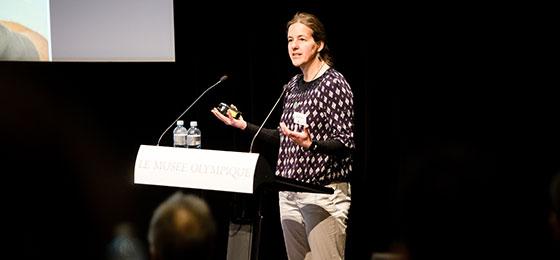Accompanying study of NRP 72 concluded

An outside look into interdisciplinary collaboration within NRP 72 supports the ambitious path taken.
Flurina Schneider, Isabelle Providoli and Christian Eismann of the University of Bern investigated collaboration within NRP 72 for a period of seven months. At the programme conference at the end of March, Schneider presented the results of the study and discussed them with the participants. The goal of the study was to understand how researchers within the NRP collaborate together across disciplines, and to show how these collaborations can be strengthened.
The process is central to the problem of increasing antimicrobial resistance, which is the result of complex processes that connect humans, animals and the environment. Moreover, a comprehensive approach also requires joint contributions from various disciplines in both research and practice. The term “One Health” is commonly used to describe this approach.
Collaboration seen as positive
Schneider has a very positive impression of NRP 72 to date. “The researchers wholeheartedly support interdisciplinary collaboration, even if it is not always easy and places high demands on them.” For example, different scientific disciplines use very different languages and concepts, which is also true of the fields that figure most prominently in NRP 72: human and veterinary medicine, environmental sciences, pharmaceutical science, chemistry, biology, physics and mathematics.
The greatest challenges, however, often come down to very practical issues such as project time management for teams whose members work at different locations, or exchanging data that uses different coding standards.
The greater the challenges, the greater the advances
Schneider based her findings on written surveys and oral interviews with project staff at all levels, from senior scientists and doctoral students to undergraduates. For many projects several people provided information.
It turned out that most researchers have experience in interdisciplinary collaboration, but NRP 72’s special focus on the comprehensive One Health approach was new to many. “We found that there are different views and unanswered questions about how the One Health approach should ideally be implemented in research”, says Schneider.
Collaboration begets self-reflection
Accordingly, some researchers would have liked more support and exchange during the project development phase. “On the other hand, it became clear that the emphasis placed on One Health research projects in the NRP 72 call for proposals also led to the field now seriously exploring these questions,” says Schneider.
It is precisely this self-reflection that Schneider considers particularly important. The highly interdisciplinary and practice-oriented research carried out within the NRP is more complex than is typically the case right from the planning stage. That is why it is necessary to pause and to check again and again: Are we going in the right direction? Are we all still talking about the same things? Do the different disciplines complement each other in a meaningful way?
Incorporating the findings in NRP 72 and beyond
NRP 72 will incorporate the feedback and will in future specifically address interdisciplinary collaboration – good experiences as well as challenges – in the annual interim project reports. The desire expressed during the investigation for more in-depth opportunities for exchange will also be reflected in further programme conferences.
Nadine Metzger, representative of the Swiss Federal Administration for NRP 72 and project leader in the area of animals for the national Strategy on Antibiotic Resistance (StAR), also sees an added value in this process that goes beyond the current NRP: “The insights gained here into the opportunities and challenges of interdisciplinary collaboration have universal significance,” she says. “Future projects will be able to draw on a better understanding of how a One Health approach helps scientists to develop better solutions. This will enable us, for example, to provide more targeted support and networking for researchers.”
